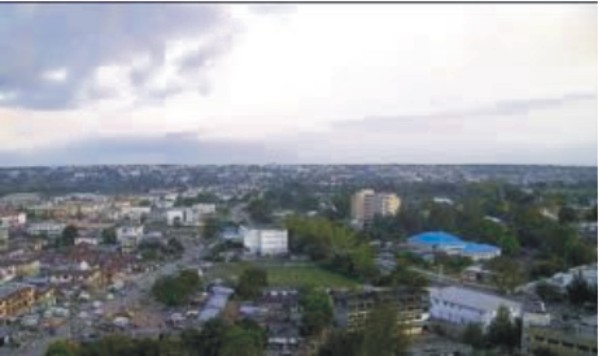Housing Delivery In 15 Years Democratic Nigeria
Housing delivery seeks the optimum provision of shelter perceived to be decent accommodation for the citizenry. The millennium development goals of 2015, target at the provision of shelter and decent accommodation. By all the assessment parameters of 2015 MDG, Nigeria occupies the lowest hierarchy. To get the nation’s economy back on track, especially in the face of the current global economic melt down, we need to prioritized the issue of our crumbling infrastructure, while working hard to rebuild confidence in our capital markets as well as banking and financial sector. The quality of infrastructure services, directly determines the quality of life for a community and its productivity. Also, the tempo of development in any nation depends very largely on the extent of infrastructural development of which its absence would definitely put paid to social, economic and political programmes of any government. Top among the list of these infrastructural facilities are roads, electricity, portable water supply, housing, primary health care, (health centres and hospitals) and markets or shopping centres.
The acute dearth of accommodation relative to population growth makes it imperative that governments (federal, state and local) place much premium on Housing delivery by putting it in the forefront in National planning. Regrettably, the only attempt made at tackling the issue of housing in the last 15 years was when former president Olusegun Obasanjo constituted a panel known as “The Peter Odidi Panel”. But, nothing substantial came out of it as no Professional Estate Surveyor and value was in the committee to make quality contribution which ended up being mere academic exercise, and talk show.
In other countries around the globe, housing contributes to about 35 to 40 percent of the GPD (Gross domestic product) while here in Nigeria it represents about a paltry 0.04 percent. The failure of government to provide houses has given rise to slum settlements even around the periphery of the areas occupied by the rich and powerful class. Besides, the notorious slums like Moroko, Ajegunle ojo, Agege (in Lagos city), now almost every major settlement is defaced with a besieging of shacks for urban poor shelters. Unfortunately, there is yet to be a government in this country that placed housing in its priority. Surprisingly too, out of the 7-point agenda by late President Umaru-Musa Yar’Adua housing is not one of them, indicative of the fact that President Umaru Yar’Adua did not bother much about housing. It is incredible to know that there is something incredible to know that there is something like National Housing Fund (NHF), which its full implementation is yet to be achieved for the obvious inability of government to make contribution of its own to the fund Thus, the NHF remains elaborate fudge till today, without much result.
Experts have leveled stunning criticism on the housing sector in the last l5years. Nothing appreciable has been done, they say, arguing that the government seems to have accorded more attention to road contracts worth several billions of Naira while doing nothing tangible on adequate housing for the urban poor. They also criticized the seven-point Agenda of President Umaru Yar’Adua which, failed to incorporate housing. In the words of Chief Kola Akomolede, the principal partner of Kola Akomolede & Co., while delivering a keynote address in a workshop lecture in Lagos to review the inroads so far in the housing sector assorted, “since 1999, I can’t see what the Federal Government has done. It is like the nation has been on holiday as far as housing was concerned. The only thing I think the Federal Government has done since 1999 is that they have been busy selling houses built by their predecessors to themselves, their friends and colleagues. We are all aware of so many scandals that trailed the houses sold in Abuja and Ikoyi where the siblings of the former first lady had houses sold to them until good reasoning prevailed and the sales were cancelled”. This assertion referred to no other than the Mrs. Mobolaji Osomo’s scandal in the sales of government houses under the OBJ’s regime.
Recall also that before the current democratic dispensation, a lot of houses were built in Lagos, such as Fetac town Satellite Town, Amuwo Odofin, Ogudu and so on. Also, the Federal Government made its presence felt by establishing housing estates in the States. Admittedly, former president OBJ in the attempt to address this issue did create the ministry of housing to a full-fledged ministry of itself. But, in the years thereafter, not much achievement was recorded b that ministry. Subsequently, President Umaru Yar’Adua cancelled the Housing ministry created by Obasanjo, his predecessor and re-integrated it with works. Interestingly, in the two years of that administration, all we heard was the award of contracts for roads construction, while nothing was being done about the housing needs of the teeming population of Nigeria. The Federal Government keeps harping so much on private partnership participation, (PPP), such that it is concerned with creating an enabling environment for the private sector. But the question remains that, how many people will the private sector cater for? The private sector can only take care of high income earners, and not the low income because they (private developers) are profit orientated or motivated.
Nevertheless, some the state governments to great extent deserve a pat on the back when talking of the vital issue c housing delivery. At state level, so many states have demonstrated appreciable sense of responsibility. The Lagos stat government takes an upper land in this regard through its property development corporation (LSPDC) which built house and established estates. The former governor Bola Ahmed Tinubu started what is known today as millennium houses am they are all over the city of Lagos in locations such as Epe, Ikorodu, Agege, Oko-Oba etc. Recently, Governor Fashola ii towing the line of his predecessor has continued to build more and more. It was also part of this process that birthed estates around Oba Oyekan and Abraham Adesanya estates in Lekki area of Lagos. Similarly in other states like Imo State, Delta, Ebonyl State etc, the state housing and urban development departments embarked on laudable housing projects with housing estates either being developed or in its construction process.
It is quite impressive to observe that Imo State government under Chief Ikedi Ohakim went back to the NHF at the behesi of the state’s special adviser to the then governor on housing and urban Development, Mr. Tito Asekhame, in an effort to address the bitting issue of housing. According to the SA, the State had acquired lands in strategic sites within urban centres like Owerri municipality for housing Schemes meant for low, medium and high income categories. That project also called for the interests of private partners for the development of affordable and decent housing for the citizens of Imo State. Essentially, that programme “housing development initiative” should have been embarked upon primarily to tackle the housing needs of the people of the state and in such a way that will involve private public partnership (PPP) as the government was to provide the lands as well as infrastructure services like road networks, electricity and portable waters while the private developers would build the houses to be sold to end users at affordable prices. Unfortunately. noting came out of such laudable programme because not an estate was built. As earlier pointed out, the idea of the Federal Government relying solely on private sector accounts to abdication of its own role. The private sector being profit motivated will only partner with government to provide houses for the low income under subsidized terms. The argument has always been that if the government build houses, they are always more expensive than what the private sector can take to build. The reason not being far from official corruption, which is endemic in government’s contract awarding process often done at inflated rates.
Supposedly, the provision of housing for the high income end should not be the primary concern of the government in any part of the world because the rich class can always take care of themselves. The Federal Government ought to borrow a leaf from some states especially the Lagos State LSDPC’s three schemes for the low, medium and high income groups. In this arrangement, the low income group get subsidy in land, cost of infrastructure which accounts for about 35% of total project costs, being left with only the actual construction costs to bank role. Whereas, the middle income pay fully for the infrastructure less the profit accruing to the government in the transaction because profit realized from high income group is used to subsidize the low income end. Equally of great concern is the truth that lack of possible access to decent housing compels people to do what otherwise they wouldn’t have done, such as financial crimes and other corrupt practices. Besides the provision of shelter, housing conditions and delivery mechanism reflects on the economy as it entails manpower and capacity building in the environment as well as engineering sector.
Therefore, housing constitutes an essential organ of economic revolution, such that the government needs to encomiast people to be proud home owners. The land use Act still remains an elaborate fudge as it cannot solve the problems encountered by people (individuals and corporate entities) in acquiring lands for projects. The seamless challenges presented by vigorous process of land titling and registration calls for the urgent need of land reforms and administration. It’s pertinent at this juncture to give kudos to the swift action of Lagos State governor Babatunde Fashola who is already partnering with experts like Lima, Peru-based institute of Liberty and Democracy headed by Dr. Hernando De Soto to update land reforms for ease of identification and transferability to create capital for people. This is where credit grant and mortgage institutions play vital roles that have multiplier effect on the economy. It was said that while studying the causes of poverty worldwide, Dr. Hernando De Soto discovered that the greater percentage of citizens in the developing world holds an informal title to land. No nation that neglects the development of robust mortgage institutions or credit financing can tackle its housing problem and by extension address its economic challenges. We have enough policy instruments to make mortgage work, but the political will is lacking to implement such policies.
The problem of difficulty in accessing vital information due to tardy process of storage and retrieval of data constitutes the bane of credit financing and mortgage facilities in Nigeria. It is not easy to access the credit history of borrowers especially individual citizens for lack of accurate data or effective mechanism of storage and retrieval of information on personal data. Consequently, urban poverty and poor living conditions could chiefly be blamed on the scarcity of basic needs (housing and infrastructure), with attendant effects to include uncontrolled urban sprawl, inadequate and over burdened infrastructure, increased and rapid sprouting of slums, unemployment, urban violence amongst others. Let us know one inexorable fact; Healthy Banks are to the economy what healthy hearts are to people. They keep them alive with the “lifeblood” of credit. But, in Nigeria, people still lack the process to represent their property and create capital. It is still a privilege to own homes and houses, far beyond the reach of many.









